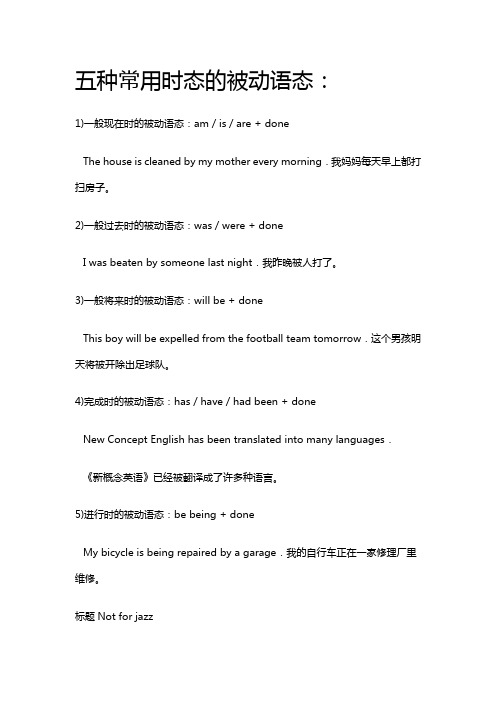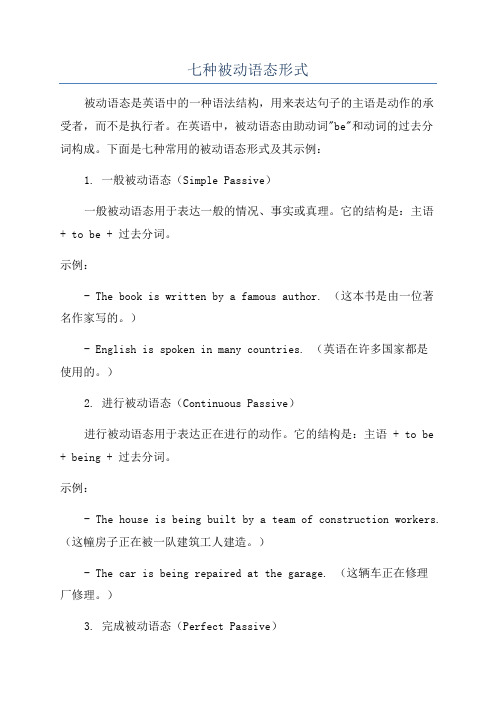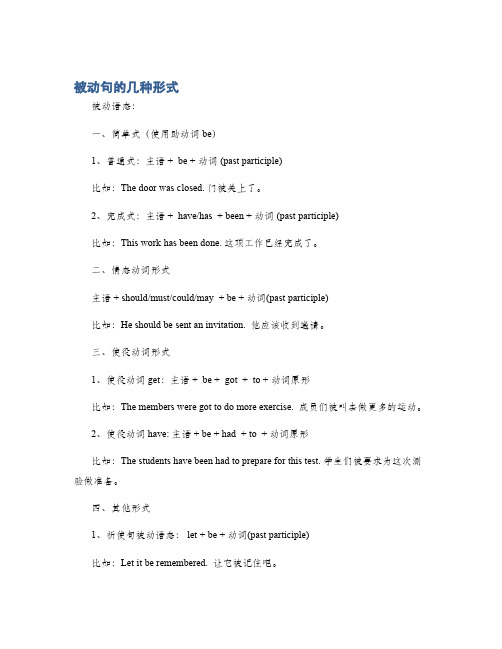被动语态
被动语态的三种形式

《有趣的被动语态三种形式》小朋友们,今天咱们来学学被动语态的三种形式,可好玩啦!第一种形式是“一般现在时的被动语态”。
比如说,“The book is read by me.(这本书被我读。
)” 就是说这本书不是自己主动被读的,而是被我读的。
第二种形式是“一般过去时的被动语态”。
像“The cake was eaten by him.(蛋糕被他吃了。
)” 这就表示蛋糕在过去的某个时候被他吃掉啦。
第三种形式是“一般将来时的被动语态”。
比如说“The game will be played by us.(这个游戏将被我们玩。
)” 意思是这个游戏在将来会被我们玩。
就像有一次,我和小伙伴玩游戏,我说“ The toy was broken by him.(玩具被他弄坏了。
)” 小伙伴一下子就明白啦。
小朋友们,是不是有点明白啦?《讲讲被动语态的三种形式》小朋友们,咱们来讲讲被动语态的三种形式哟!先来说说“一般现在时的被动语态”。
比如说“ The door is opened.(门被打开了。
)” 不是门自己打开的,是有人把它打开的。
然后是“一般过去时的被动语态”。
像“ The letter was written.(信被写了。
)” 这表示信在过去被写好啦。
最后是“一般将来时的被动语态”。
比如说“ The party will be held.(聚会将被举办。
)” 就是说聚会在将来会被举办。
比如说,学校里要举办活动,老师说“ The show will be prepared by you.(表演将由你们准备。
)” 小朋友们就知道要准备表演啦。
小朋友们,能记住这三种形式吗?《说说被动语态的三种形式》小朋友们,今天来说说被动语态的三种形式。
第一种,“一般现在时的被动语态”,像“ The song is sung.(歌被唱。
)” 歌不会自己唱,是被人唱的。
第二种,“一般过去时的被动语态”,比如“ The tree was cut.(树被砍了。
被动语态的例子

被动语态的例子以下是 8 条关于被动语态的例子:1. 哎呀,我的手机被摔坏了!就像我的心被伤了一样。
例子:The phone was broken by me.(手机被我摔坏了。
)2. 你看,那扇门被关上了呀!这感觉就像是通往某个神秘世界的入口被封闭了。
例子:The door was closed.(门被关上了。
)3. 哇塞,这个惊喜被她发现啦!真像精心隐藏的宝藏被找到了。
例子:The surprise was discovered by her.(惊喜被她发现了。
)4. 糟糕,我的秘密被他知道了!那可好比我的隐私城堡被攻破了一样。
例子:My secret was known by him.(我的秘密被他知道了。
)5. 嘿嘿,这顿饭被妈妈做好了耶!仿佛一顿美味的盛宴被呈现在我们面前。
例子:The meal was cooked by mom.(这顿饭被妈妈做好了。
)6. 呀,那只小狗被车撞到了啊!好像它的小世界被突然打乱了。
例子:The dog was hit by the car.(那只小狗被车撞到了。
)7. 天呐,我的作业被老师拿走了!就如同我精心创作的宝贝被夺走了。
例子:My homework was taken away by the teacher.(我的作业被老师拿走了。
)8. 哎呀呀,这场比赛被他们赢了呀!好似我们的冠军宝座被抢走了。
例子:The game was won by them.(这场比赛被他们赢了。
)观点结论:被动语态在生活中随处可见呢,它让我们的表达更加丰富多样呀!。
五种常用时态的被动语态

五种常用时态的被动语态:1)一般现在时的被动语态:am/is/are + doneThe house is cleaned by my mother every morning.我妈妈每天早上都打扫房子。
2)一般过去时的被动语态:was/were + doneI was beaten by someone last night.我昨晚被人打了。
3)一般将来时的被动语态:will be + doneThis boy will be expelled from the football team tomorrow.这个男孩明天将被开除出足球队。
4)完成时的被动语态:has/have/had been + doneNew Concept English has been translated into many languages.《新概念英语》已经被翻译成了许多种语言。
5)进行时的被动语态:be being + doneMy bicycle is being repaired by a garage.我的自行车正在一家修理厂里维修。
标题Not for jazz总结for的用法:1)为:I bought a book for you.我为你买了一本书。
2)因为:Something fell in,for I heard a splash.一定有东西掉下去了,因为我听见扑通一声。
4)适合:Not for jazz=It's not suitable to play jazz on the clavichord.古钢琴不适合演奏爵士乐。
Question:What happened to the clavichord?to后面加宾语,表示其身上发生了什么事,即动作的目标、对象。
What happened to you?你怎么了?(在你身上发生了什么事?)(1)否定句与疑问句的被动语态We don’t believe her.我们不信她的话。
七种被动语态形式

七种被动语态形式被动语态是英语中的一种语法结构,用来表达句子的主语是动作的承受者,而不是执行者。
在英语中,被动语态由助动词"be"和动词的过去分词构成。
下面是七种常用的被动语态形式及其示例:1. 一般被动语态(Simple Passive)一般被动语态用于表达一般的情况、事实或真理。
它的结构是:主语+ to be + 过去分词。
示例:- The book is written by a famous author. (这本书是由一位著名作家写的。
)- English is spoken in many countries. (英语在许多国家都是使用的。
)2. 进行被动语态(Continuous Passive)进行被动语态用于表达正在进行的动作。
它的结构是:主语 + to be + being + 过去分词。
示例:- The house is being built by a team of construction workers. (这幢房子正在被一队建筑工人建造。
)- The car is being repaired at the garage. (这辆车正在修理厂修理。
)3. 完成被动语态(Perfect Passive)完成被动语态用于表达已经完成的动作。
它的结构是:主语 + to have been + 过去分词。
示例:- The cake has been eaten by all the guests. (这个蛋糕已经被所有的客人吃掉了。
)4. 一般完成被动语态(Simple Perfect Passive)一般完成被动语态用于表达已经完成的一般情况、事实或真理。
它的结构是:主语 + to have been + 过去分词。
示例:- The job offer has been rejected by many applicants. (这个工作邀请已经被许多申请人拒绝了。
八大时态的被动语态结构

八大时态的被动语态结构
以下是八大时态的被动语态结构:
1. 现在时被动语态(Present Simple Passive):主语 + am/is/are + 过去分词。
2. 过去时被动语态(Past Simple Passive):主语 + was/were + 过去分词。
3. 将来时被动语态(Future Simple Passive):主语+ will be + 过去分词。
4. 现在进行时被动语态(Present Continuous Passive):主语 + am/is/are being + 过去分词。
5. 过去进行时被动语态(Past Continuous Passive):
主语 + was/were being + 过去分词。
6. 现在完成时被动语态(Present Perfect Passive):
主语 + has/have been + 过去分词。
7. 过去完成时被动语态(Past Perfect Passive):主语 + had been + 过去分词。
8. 将来完成时被动语态(Future Perfect Passive):主语 + will have been + 过去分词。
被动句的几种形式

被动句的几种形式被动语态:一、简单式(使用助动词be)1、普通式:主语 + be + 动词 (past participle)比如:The door was closed. 门被关上了。
2、完成式:主语 + have/has + been + 动词 (past participle)比如:This work has been done. 这项工作已经完成了。
二、情态动词形式主语 + should/must/could/may + be + 动词(past participle)比如:He should be sent an invitation. 他应该收到邀请。
三、使役动词形式1、使役动词 get:主语 + be + got + to + 动词原形比如:The members were got to do more exercise. 成员们被叫去做更多的运动。
2、使役动词 have: 主语 + be + had + to + 动词原形比如:The students have been had to prepare for this test. 学生们被要求为这次测验做准备。
四、其他形式1、祈使句被动语态: let + be + 动词(past participle)比如:Let it be remembered. 让它被记住吧。
2、there+ be 结构:there + be + 主语 + 动词(past participle)比如:There was an earthquake yesterday. 昨天发生了一次地震。
3、it 作形式主语+be+done: it + be + done + that + 句子比如:It is said that the environment is being seriously polluted. 据说环境受到严重污染。
随着社会的发展,被动语态功能的使用越来越普遍,它不仅可以强调动作本身,也可以强调说话者关注的对象。
被动语态的10种时态形式

被动语态的10种时态形式一、一般现在时的被动语态:被动语态的一般现在时表示主语在现在时被动地接受动作或承受行为。
构成为:be + done。
例如:1. The book is read by me.(这本书被我阅读。
)2. The door is locked by him.(门被他锁上了。
)二、一般过去时的被动语态:被动语态的一般过去时表示主语在过去时被动地接受动作或承受行为。
构成为:was/were + done。
例如:1. The cake was eaten by them.(蛋糕被他们吃掉了。
)2. The letter was written by me.(信被我写了。
)三、一般将来时的被动语态:被动语态的一般将来时表示主语在将来时被动地接受动作或承受行为。
构成为:will be + done。
例如:1. The report will be sent by her.(报告将会被她发送。
)2. The package will be delivered tomorrow.(包裹将在明天被送达。
)四、现在进行时的被动语态:被动语态的现在进行时表示主语在现在进行时被动地接受动作或承受行为。
构成为:am/is/are being + done。
例如:1. The car is being washed by the workers.(汽车正在被工人清洗。
)2. The project is being discussed by the team.(项目正在被团队讨论。
)五、过去进行时的被动语态:被动语态的过去进行时表示主语在过去进行时被动地接受动作或承受行为。
构成为:was/were being + done。
例如:1. The house was being renovated last month.(房子上个月正在进行装修。
)2. The document was being translated by the intern.(文件正在被实习生翻译。
被动语态句子结构

被动语态句子结构被动语态的句子是以“动词+过去分词”的形式来表达,如果要特别强调动作或行为的执行者时,句子后面需接by~,译为“被(由)……”。
1、被动语态的句型肯定句:主语+be +过去分词+(by~).否定句:主语+be not +过去分词+(by~).一般疑问句:Be +主语+过去分词+(by~)?特殊疑问句:疑问词+be +主语+过去分词+(by~)?被动语态的时态是由be的时态决定的,be是什么时态,全句就是什么时态,be动词后面的过去分词不变。
2、被动语态的十种时态以动词give为例,其被动语态的各种时态构成如下:(1)一般现在时例:History is made by the people.历史是人民创造的。
(2)一般过去时例:These new cars were made in Tianjing in 1994.这些新车是1994年在天津生产的。
(3)一般将来时例:Li Ming will be asked to attend the lecture.李明将被邀请参加讲座。
(4)现在进行时例:A new railway is being built.一条新铁路正在修建。
(5)过去进行时例:The roads were being widened.路那时正在加宽。
(6)现在完成时例:He has been sent to work in Shanghai.他已经被派往去上海工作了。
(7)过去完成时例:A new hotel had been built when I got there.我到那儿时,一座新旅馆已经建好了。
(8)过去将来时例:He said a new hotel would be built in two months.他说两个月后新旅馆就会建好了的。
3、被动语态的否定句和疑问句例:English is not used in European countries.欧洲国家不使用英语。
- 1、下载文档前请自行甄别文档内容的完整性,平台不提供额外的编辑、内容补充、找答案等附加服务。
- 2、"仅部分预览"的文档,不可在线预览部分如存在完整性等问题,可反馈申请退款(可完整预览的文档不适用该条件!)。
- 3、如文档侵犯您的权益,请联系客服反馈,我们会尽快为您处理(人工客服工作时间:9:00-18:30)。
被动语态英语中有两种语态:主动语态和被动语态。
主动语态表示主语是动作的执行者。
被动语态表示主语是动作的承受者一. 被动语态使用要点:1. 不及物动词/不及物性短语动词不能用于被动语态appear, die, happen, occur, belong to, break out, take place2. 表示状态的动词不能用于被动语态英语中有些动词/短语动词不是表示动作,而是表示某种状态或情况,有“拥有,容纳,适合,缺少,明白”等意。
这类词不能用于被动语态。
lack, fit, mean, hold, have, cost, contain, suit, last, become, possess, benefit, fail, look like二构成:被动语态由助动词be+过去分词构成,时态通过be表现出来。
一般现在时:am/is/are+p.p.一般过去时:was/were+p.p.一般将来时:shall /will be +p.p.现在完成时:have /has been +p.p.现在进行时:am/is/are+being+p.p.过去将来时:should /would be +p.p.含情态动词的被动结构:情态动词+be+p.p.带不定式的被动结构:The homework needs to be done with care.※将主动语态变被动语态应注意几个特殊情况:一.含双宾语的主动结构变为被动结构时,有两种方法:①将间接宾语变为主语,直接宾语保持不变;②将直接宾语变为主语,间接宾语用介词to或for引导。
例如:He told us a story.(变被动语态)→We were told a story(by him).或:A story was told to us by him.有时用间接宾语作主语讲不通,或不习惯,也须转用直接宾语作主语。
如:My girl friend writes me a letter every week.I am written a letter by my girl friend every week.(错句)A letter is written to me by my girl friend every week.类似的动词有:return,send,pass,hand,sell,teach等。
二、短语动词的被动语态:在变为被动语态时,要将短语动词视为一个整体,其后的介词或副词不能省去。
1 动词+介词:agree to, ask for, call for, laugh at, listen to, look after, operate on, send for, talk about, think of等。
a.The doctor has already been sent for.b.The news has never been heard of before.类似的短语动词有:call on,look after,talk about,look at,ask for,wait for...2.动词+副词:bring about, carry out, find out, give up, hand in, make out, pass on, point out, put away, put off, take up, think over, turn down, turn out, wipe out, work out等。
a.A new play will be put on (上演) next week.b.The problem has been worked out.3.动词+副词+介词:do away with, face up to, give in to, look down upon, make up for, put up with,类似的短语动词有:get out of,look out of,get on with,get along with (与。
相处),等。
a.The poor were looked down upon before liberation.解放前穷人被人瞧不起。
b.He was looked up to by everyone.他被人们所敬仰。
catch up with (赶上),keep up with (跟上)...4.动词+名词+介词类似的短语动词有:catch sight of, keep an eye on, make use of, make a fool of, pay attention to, put an end to, set fire /light to, take care of, take hold of, take notice of 等。
a.Lin Fen can take good care of your children.1)Your children can be taken good care of by Lin Feng.2)Good care can be taken of your children by Lin Feng.b.They never paid attention to (注意、关注) the matter.1)The matter was never paid attention to.2)Attention was never paid to the matter.三。
带复合宾语的动词在改为被动语态时,一般把主动结构中的宾语改成主语,宾语补足语保留在谓语后面。
例如:We always keep the classroom clean.(比较:The classroom is always kept clean.)四。
有些动词形式上是主动结构,但表示被动的意思。
1。
表示开始,结束类的动词。
Start, open, begin, close, stop. EndThe meeting ended at11 o’clock.2。
表示烹调,饮食方面的。
The meat is cooking now.3. 表示主语的特征和状态的(后需加adv. well/easily)。
read, write, sell, clean, wash, wear, burn, lock等The cloth washes well.这布很经洗。
The new product sells well.这新产品很畅销。
The pen writes well.这枝笔很好用The girl does not photograph well.(强调女孩的特点,不上照。
)The girl has not been photographed well.(与女孩本人无关,在于摄影师没有照好。
)4。
表示“需要”need/want/require doing = need/want/require to be done5 be to blame/be to rent 主动表被动6. be + adj. + 不定式此类形容词有easy/ hard/comfortable/dangerous/difficult/heavy/fit7.感官动词和系动词+adj. feel/ look/smell/sound/taste/prove….The water feels cold.8. be worth + doing6)下列情况主动句不能改成被动句:①谓语是及物动词leave, enter, reach, suit, benefit, lack等。
②谓语是不可拆开的短语动词take place, lose heart, belong to, consist of等。
③宾语是反身代词,相互代词,同源宾语,不定式,动名词,抽象名词等。
7)汉语有一类句子不出现主语,在英语中一般可用被动结构表示。
例如:据说…… It is said that …希望… … It is hoped that …据推测说… … It is supposed that …必须承认… … It must be admitted that …必须指出… … It must be pointed out that … 众所周知… … It is well known that …注意:这种结构可改为“Sb/Sth + be + pp + 动词不定式” 。
例如:It is said that Tom has got the first place in the exam.=Tom is said to have got the first place inthe place.It was reported that her mother died of SARS.=Her mother was reported to have died of SARS.※被动语态和过去分词作表语的区别:含义不同:被动语态强调动作,重点说明动作由谁完成、怎样完成;而过去分词作表语通常用来描写情景,叙述人或事物的特征及所处的状态。
试比较:The window is broken.窗子破了。
(系表结构)The window is broken by him.窗子被他打破了。
(被动语态)。
